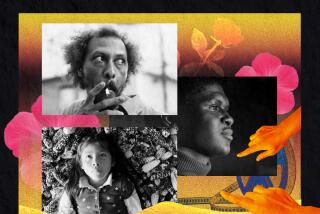Indie Focus: Leos Carax and his ‘Holy Motors’
- Share via
When Leos Carax shrugs, it is a gesture not of Gallic ambivalence but of existential bewilderment. The 51-year-old writer-director tends to shrug a lot.
Since the premiere of his “Holy Motors” at this year’s Cannes Film Festival, where the enigmatic Carax gave no interviews, the film has been widely hailed as a triumph, with even its detractors acknowledging its audacity and some critics declaring it the film of the year. His first feature in 13 years, it reunites the filmmaker with Denis Lavant, who starred in Carax’s first three features, including the recklessly indulgent 1991 romance “The Lovers on the Bridge,” which costarred the director’s then girlfriend, Juliette Binoche.
VIDEO: A guide to AFI Fest 2012
In “Holy Motors” Lavant plays Monsieur Oscar, a man ferried around Paris in a white limousine to transform himself into a series of characters, fulfilling the role of father, assassin, imp, lover, old woman, motion-capture model, accordionist and others, putting into relief the way in which we all play our parts in our everyday lives. In a tender scene between a father and his teenage daughter, the deep connection between the actor and director is underlined when Lavant wears Carax’s own clothes.
It is easy to overemphasize the strangeness of the film, which opens Friday in Los Angeles, without acknowledging its unlikely accessibility and emotional clarity even as its narrative logic is oblique. “Holy Motors” is freewheeling, not forbidding.
“It’s in a way very simple, but that doesn’t mean that every question gets answered,” Carax said recently in Los Angeles. “The experience of watching it is quite simple. It gets complicated for people who want to make sure that they get it, people who are afraid of being less clever than the film or more clever than the film. In which case they are not with the film.”
The bold, idiosyncratically personal vision of Carax’s work has garnered him admirers from around the world. An interview tucked into a hotel’s quiet corner overlooking Hollywood Boulevard was briefly interrupted when Korean filmmaker Kim Ki-duk, who won the top prize at the Venice Film Festival this year, excitedly stopped by to introduce himself. Carax seemed unsure how to take the enthusiasm.
“I don’t really feel like a filmmaker,” noted Carax. “I feel I live in cinema, I live on the island of cinema, but I don’t feel like a filmmaker. I’m someone who sometimes makes a film. Each time it feels like the first and the last.”
His new film richly interweaves cinema history, elements from Carax’s own life and a fantasy imagination. Carax appears in the film’s prologue as a man who awakens and unlocks a secret door. His young daughter makes a brief appearance, and the film is dedicated to the girl’s mother, Yekaterina Golubeva, who appeared in Carax’s 1999 film “Pola X” and died last year.
There are pivotal roles played by veteran French performers Michel Piccoli and Edith Scob as well as pop star Kylie Minogue. As a rousing intermission, Lavant leads a charging armada of accordion players.
American actress Eva Mendes appears as a model snatched away to a cave by a character reprised from Carax’s entry in the 2008 anthology film “Tokyo!” “I felt like I was in a theme park of a film,” Mendes said while waiting for the start of the film’s recent Los Angeles premiere.
His introduction to that screening during AFI Fest, which played to an enthusiastic house despite a long technical delay, was in its entirety, “Thank you for coming. Thank you for waiting. Hollywood. Digital. I hope you enjoy the film. Or not.”
Following a string of ultimately unrealized projects in America, Russia and London, Carax wrote “Holy Motors” fast, over the course of just a few weeks. He does not start his process with a story or idea but rather “two or three images, two or three feelings and then I try to edit those feelings into those images, a bit like chemistry.”
One of those images was the white limousine, which he saw first in America and then for wedding parties in his neighborhood in Paris. “They really want you to look at them and you can’t see inside them,” he said. “You don’t buy these cars, you rent them, like a life for rent, so people know they are playing roles in these cars, kids going to parties, pretending to be famous or rich for a night. So I took this idea of being an avatar of ourself and carried it further.”
A second image of elderly beggar women on the bridges of Paris led to the idea of the shape-shifting Monsieur Oscar: actor, avatar and a man at work. For the ambitious, multi-faceted part, Carax knew he could call only on Lavant.
Though Carax will say the two do not really know each other well even after some 30 years, Lavant notes that they have in recent years become something more like friends.
“Leos is about one year older than I am, so I always have the feeling I am working with a big brother,” said Lavant, on the phone from Paris. “Any time we are working together, we are pushing the envelope and I have to be confronted to be completely creative, to do new things.”
Carax was born with the name Alex Dupont, and “Leos Carax” is an anagram of “Alex” with “Oscar.” For a man who lives his life with a jumble for a name, it is not surprising Carax includes fragments of himself in the swirl of his filmmaking.
“Of course it’s all personal,” he said with one more shrug. “When you imagine something it’s personal.”
PHOTOS AND MORE:
VIDEO: A guide to upcoming movies
The Envelope: Awards Insider
PHOTOS: NC-17 movies: Ratings explained
More to Read
Only good movies
Get the Indie Focus newsletter, Mark Olsen's weekly guide to the world of cinema.
You may occasionally receive promotional content from the Los Angeles Times.











